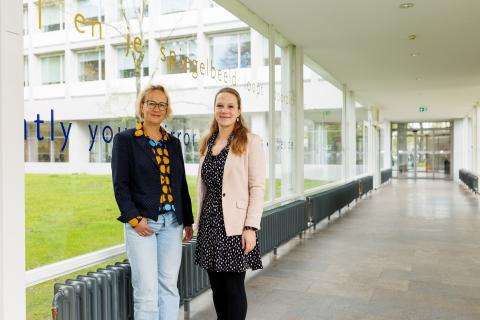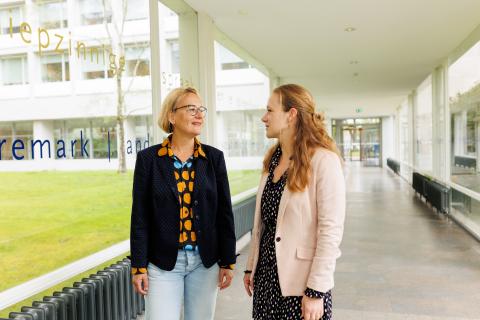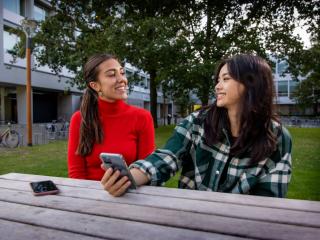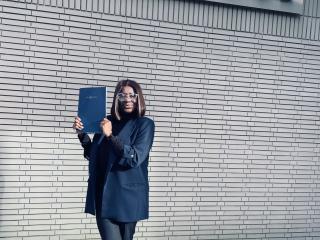“With education focused on lifelong development, we bring science and practice together”
With its current educational range, Tilburg University is still mainly focused on educating young adults. This is also known as initial education. But change is on the horizon. With Lifelong Development (LLD) as a strategic spearhead, the university plans to expand its post-initial range of educational programs for professionals step by step.
Several months ago, a team headed by Inge van Rijt commenced efforts to make the university’s ambitions a reality. Antoinette de Bont, Dean of the Tilburg School of Social and Behavioral Sciences (TSB), serves as the driving force in this process. Together, the women explain why it is important for the university to develop more programs for professionals, what the university has to offer, and to whom.

Societal duty to share knowledge
“Research at the university results in the development of a lot of knowledge, and, as a university, it is our societal duty to share our knowledge. With education focused on lifelong development, we bring science and practice together. In this context, the goal is not only knowledge exchange, but also joint critical reflection”, explains Inge.
The labor market and society are changing rapidly. Inge and Antoinette believe the university can help professionals, including its own alumni, stay up to date on the latest developments. “For example, think about the impact AI and big data are having on our legal system, how we work, and the opportunities these developments offer healthcare. Or the behavioral changes that are necessary to make important transitions, such as the energy transition. This raises all kinds of issues, and our scientists can offer assistance to professionals and point them in the right direction. From economic queries to legal, ethical, psychological, and philosophical issues.”
No distinction in age or educational level
“The university also has an emancipatory role”, adds Antoinette. “Lifelong development does not distinguish between age or educational level. This means we do not only focus on alumni, but on everyone who feels strongly connected to the themes our university excels at. We offer scientific knowledge, and, as a participant, you need to be open to critical reflection, have an interest in analyzing issues, and possess the ability to get an overview of the consequences. Where you are in your career is irrelevant.”
Companies in particular are paying more and more attention to the sustainable development of personnel. Inge and Antoinette believe that, as a university, we need to impress upon students that it is important to stay up to date and to continue your personal development. “We want to make sure that they continue to feel part of our academic community, even after graduation, and that they know that knowledge is and will continue to be available to them, that they are always welcome, and that they also have something to offer us.”
Together, scientists and professionals can learn how to tackle certain issues in practice by reflecting on matters from various perspectives.
Antoinette de Bont
Co-creation between science and practice
When it comes to LLD education, professionals can do more than just take. “As scientists, we are not omniscient”, says Antoinette. “Bringing together science and practice also provides an opportunity for our scientists to broaden their horizons. Together, scientists and professionals can learn how to tackle certain issues in practice by reflecting on matters from various perspectives.”
Inge emphasizes that LLD education is not a one-way street and that it does not always take the form of traditional, in-class education. “Other options include peer-review meetings and company visits by scientists. Critical thinking and providing direction in the thicket of new developments; those are areas our scientists excel at. Professionals then know best how to implement insights into practice.”
Aligning supply and demand
Not all scientific knowledge is suitable or relevant for education for professionals. To ensure that the need from the professional practice is met, it is important that the lifelong development programs are properly aligned with the demand. This requires good cooperation. Inge: “We work with regional partners, for example, such as MidPoint Brabant, BrabantLeert.nl, Hoger Onderwijs Kennispact and Brainport.

We work with other educational institutions in the region to design a comprehensive range of programs that complement each other, and we also focus on the knowledge required for the transitions we face as a region.”
Current and future range
The university’s current lifelong development range is already diverse, and can now be found on this website. This range will be expanded step by step. Inge: “With the TIAS School for Business and Society, we already have a strong range of programs in areas including Executive Education. There are also great initiatives from Tranzo, the Institute for Family Business, and in areas such as accountancy, big data | AI & law, theology, business ethics, and the professionalization of teachers. For a long time, initiators had to make do without centralized support and had to organize everything themselves. The new LLD team is here to relieve their burden. This not only benefits them, but participants as well. They will have access to a clearer overview of the complete lifelong development range. In addition, we will be able to service them with more streamlined processes, for example when it comes to enrollment and payments. Once this foundation is in order, we will shift our focus more and more to developing new programs to expand the range. Focal points include providing quality, meeting a need and generating impact.”
Want to know more?
Check out an overview of the university’s range of LLD programs here
Date of publication: 25 April 2024



